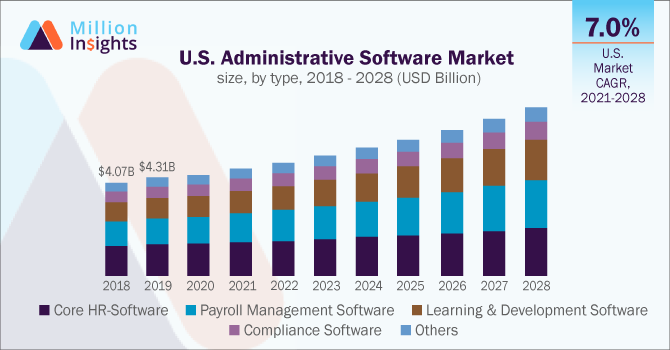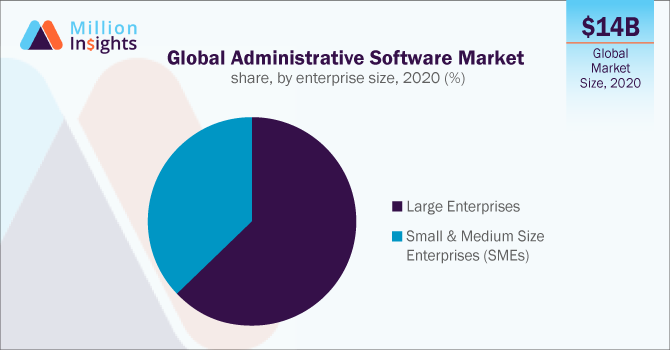The global administrative software market size was valued at USD 14.01 billion in 2020 and is expected to grow at a compound annual growth (CAGR) of 7.0% from 2021 to 2028. The rising need for enterprise management software to reduce the cost of IT operations, manage administrative tasks efficiently, and streamline the complexity of management tasks are propelling the market growth. Due to the growing acceptance of cloud computing technologies among businesses and technological breakthroughs in the IT sector, administrative software has gained popularity in recent years. With the implementation of administrative software, business processes and tasks that required human intervention are now automated and the workforce can focus on their core functionalities.

The demand for administrative software is likely to be driven by a rapid expansion in the volume of corporate data and increased automation of management tasks across a variety of verticals, such as manufacturing, retail, transportation, and healthcare. Over the next several years, the growing technology-focused projects and expanding IT budgets in enterprises are anticipated to create decent prospects for the global market. Various businesses across the world are incorporating administrative software into their business operations and expanding their scale to serve a larger market, which is propelling market growth. Furthermore, the rising adoption of advanced technologies, such as Cloud Computing, Machine Learning, Artificial Intelligence (AI), and Hybrid Architecture, is expected to have a profound impact on the global market over the forecast period.
Technological advancements in the fields of cloud computing, hybrid cloud, enterprise planning strategies, and digital transformation are likely to promote product innovation and development ahead, thus, contributing to the growth of the market. The ongoing competition between solution developing companies, major and traditional vendors, and new start-ups & niche vendors, is predicted to continue. Furthermore, administrative software vendors and developing companies are collaborating with important System Integrators (SIs) and Independent Software Vendors (ISVs) to enhance their market and industry reach.
In addition, the global market is predicted to develop at a higher pace due to the ongoing price trends, ease of setup, and growing commercial applications of administrative systems across industries and sectors. The current COVID-19 pandemic has pushed many large enterprises and SMEs to implement Work-From-Home (WFH) policies while creating a strong demand for business administration and collaborative applications. Administrative software is playing an important role in dealing with COVID-19 to create a safe work environment. Enterprises and businesses are deploying administrative software and solutions for digital growth and therefore the market is expected to witness strong growth during the complex environment of COVID-19.
The cloud deployment segment accounted for the largest share of more than 70.0% of the global revenue in 2020. The segment is also estimated to retain the leading position growing at the fastest growth rate over the forecast period. Cloud-based enterprise solutions are widely adopted by organizations on account of various benefits offered by them, such as scalability, high flexibility, cost-effectiveness, and low maintenance cost. Organizations are preferring cloud-based administrative solutions as they are hosted on vendor’s servers and eliminate the need for manual processes and allow users to access data in a hassle-free manner.
On the basis of deployment, the market is bifurcated into cloud and on-premises. The on-premises deployment segment also accounted for a significant share of the global market in 2020. The segment is estimated to expand further at the second-fastest CAGR during the forecast period. Many large-scale companies across the globe are opting for the on-premises model to deploy their enterprise solutions as it favors them to store business-critical information and provide servers with advanced data security. A rise in investments in enterprise software and business process management solutions is likely to boost the segment growth over the forecast period.
The core HR software segment accounted for the largest share of more than 31.5% of the global revenue in 2020. The growth of the segment is mainly driven by the fast technological pace, increased automation in HR procedures, and increased adoption of cloud technology. The growth of the segment is mainly characterized by a technological shift from traditional human administrative HR tasks to talent management and tracking solutions integrated with applicant tracking and learning management systems. In addition, the increased adoption of Bring Your Own Device (BYOD) trend among HR departments is likely to drive the segment growth.
However, the learning and development segment is expected to register the fastest CAGR of over 8.5% during the forecast period. Major driving factors for the growth of the learning & development software segment are the increasing trend of BYOD and enterprise mobility, continuous innovation in e-Learning and corporate training, and growing emphasis on continuous learning. Furthermore, considerable cost savings over traditional learning systems, as well as proven results based on increased productivity and efficiency, are anticipated to promote the growth of learning and development software.
The large enterprises segment dominated the market with a share of more than 60% of the global revenue in 2020. Large enterprises are spending significantly in R&D, which enables them to leverage progressive digital solutions, including cloud-based administrative solutions to improve their business processes. Large enterprises are taking key measures for a higher market share, and hence invest enormous resources in becoming technologically competent. Furthermore, large businesses invest heavily in software workshops, technical training, and education for their employees to provide them with the most up-to-date information on the newest trends and technological breakthroughs in the administrative software industry.

This will contribute to the segment growth. On the other hand, the small- & medium-sized Enterprises (SMEs) segment is estimated to register the fastest growth rate of more than 7.5% from 2021 to 2028. Small- and medium-sized organizations are thriving to strengthen their market position and gain higher revenue streams. Thus, they are heavily dependent on technological tools and software to optimize their resources and business processes. The growing need to reduce extra operational costs and smoothen business functionality is expected to drive the adoption of administrative software and services among SMEs.
North America accounted for the largest share more than 41% of the global revenue in 2020 mainly owing to the existence of several major administrative software providers, as well as numerous organizations and enterprises, across the region that rely on modern technology. Since various firms are deploying administrative software to improve business management and administrative activities, the market in North America has become progressive. Companies in North America, particularly in the U.S. and Canada, are integrating administrative software solutions to improve workplace cooperation and revamping ineffective company management processes.
Asia Pacific is likely to expand at the fastest CAGR from 2021 to 2028 on account of the strong economic growth and ongoing developments in business management, prompting organizations to invest heavily in the market to maintain growth and improve productivity. In addition, huge shifts toward digital transformation, cloud deployment, and technical improvement among SMEs, as well as continual modernization in marketing and sales strategy in emerging nations, contribute significantly to market growth. Furthermore, to stay competitive in the market, leading companies in APAC are focused on improving their operations and overall efficiency, which is likely to create a lucrative growth opportunity for the market.
Leading industry participants are investing heavily in R&D to boost organic growth and enhance their market share. Companies are also developing new products to grow and reinforce their present portfolios and attract new customers. Mergers and acquisitions, as well as strategic alliances, are being used by businesses to produce technologically sophisticated solutions and obtain a competitive advantage over their competitors. Some of the prominent players operating in the global administrative software market include:
|
Report Attribute |
Details |
|
Market size value in 2021 |
USD 14.76 billion |
|
Revenue forecast in 2028 |
USD 23.77 billion |
|
Growth rate |
CAGR of 7.0% from 2021 to 2028 |
|
Base year for estimation |
2020 |
|
Historical data |
2017 - 2019 |
|
Forecast period |
2021 - 2028 |
|
Quantitative units |
Revenue in USD million/billion and CAGR from 2021 to 2028 |
|
Report coverage |
Revenue forecast, company ranking, competitive landscape, growth factors, and trends |
|
Segments covered |
Enterprise size, deployment, type, and region |
|
Regional scope |
North America; Europe; Asia Pacific; Central & South America; Middle East & Africa |
|
Country scope |
U.S.; Canada; U.K.; Germany; France; China; India; Japan; Brazil; Argentina; GCC; South Africa |
|
Key companies profiled |
Workday, Inc.; Intuit Inc.; ServiceNow Inc.; The Sage Group PLC; International Business Machines (IBM) Corp.; Salesforce.com, Inc.; Oracle Corp.; Microsoft Corp.; ZOHO Corp.; Cisco Systems Inc. |
|
Customization scope |
Free report customization (equivalent up to 8 analysts’ working days) with purchase. Addition or alteration to country, regional & segment scope. |
This report forecasts revenue growth at the global, regional, and country levels and provides an analysis of the latest industry trends in each of the sub-segments from 2017 to 2028. For the purpose of this study, Million Insights has segmented the global administrative software market report on the basis of enterprise size, deployment, type, and region:
Sign up today.
Call us at +1-408-610-2300 to speak with a
representative.